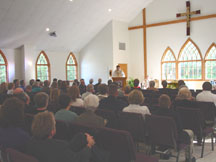The meaning behind the words
“We believe in one God…”
“God’s peace be with you.”
“Our Father, who art in heaven…”
“Thanks be to God.”
Phrases we all know and say often…so often in fact that they are in danger of losing meaning. It’s happened to all of us at some point or another…you’re saying the Nicene Creed when suddenly your mind strays to what you want to have for lunch or what happened in the book you were reading before bed last night. It’s an easy trap to fall into when parts of the liturgy become second nature. How can we avoid complacency and enable our worship community to do the same?
 Just because the words are the same each week does not mean the message of God’s love for us becomes less important, less true. Think about the meaning behind the words, the fact that they are the joyful proclamation of God’s grace in our lives. We are called not only to spread the good news to others but to remind ourselves of it, not only to believe but to proclaim our belief in our worship and praise. If we can do this we can open our hearts and minds to what God may be trying to say to us rather than becoming mired in meaningless words.
Just because the words are the same each week does not mean the message of God’s love for us becomes less important, less true. Think about the meaning behind the words, the fact that they are the joyful proclamation of God’s grace in our lives. We are called not only to spread the good news to others but to remind ourselves of it, not only to believe but to proclaim our belief in our worship and praise. If we can do this we can open our hearts and minds to what God may be trying to say to us rather than becoming mired in meaningless words.
Loren Hague, Intern
King of Peace Episcopal Church
“God’s peace be with you.”
“Our Father, who art in heaven…”
“Thanks be to God.”
Phrases we all know and say often…so often in fact that they are in danger of losing meaning. It’s happened to all of us at some point or another…you’re saying the Nicene Creed when suddenly your mind strays to what you want to have for lunch or what happened in the book you were reading before bed last night. It’s an easy trap to fall into when parts of the liturgy become second nature. How can we avoid complacency and enable our worship community to do the same?
 Just because the words are the same each week does not mean the message of God’s love for us becomes less important, less true. Think about the meaning behind the words, the fact that they are the joyful proclamation of God’s grace in our lives. We are called not only to spread the good news to others but to remind ourselves of it, not only to believe but to proclaim our belief in our worship and praise. If we can do this we can open our hearts and minds to what God may be trying to say to us rather than becoming mired in meaningless words.
Just because the words are the same each week does not mean the message of God’s love for us becomes less important, less true. Think about the meaning behind the words, the fact that they are the joyful proclamation of God’s grace in our lives. We are called not only to spread the good news to others but to remind ourselves of it, not only to believe but to proclaim our belief in our worship and praise. If we can do this we can open our hearts and minds to what God may be trying to say to us rather than becoming mired in meaningless words.Loren Hague, Intern
King of Peace Episcopal Church







0 Comments:
Post a Comment
<< Home